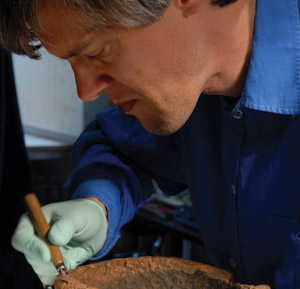 Pittsburgh Theological Seminary will host Dr. Christopher Bronk Ramsey from Oxford University, Tues., Oct. 22, 2013 at 7:30 p.m. for the archaeology lecture “Developing Scientific Chronologies for Archaeology: How Radiocarbon Dating and Volcanic Eruptions Can Help Us Better Understand Our Past.”
Pittsburgh Theological Seminary will host Dr. Christopher Bronk Ramsey from Oxford University, Tues., Oct. 22, 2013 at 7:30 p.m. for the archaeology lecture “Developing Scientific Chronologies for Archaeology: How Radiocarbon Dating and Volcanic Eruptions Can Help Us Better Understand Our Past.”
In recent years, radiocarbon dating of organic remains has become an increasingly significant part of archaeological fieldwork, and under the direction of Professor Ramsey, the Radiocarbon Accelerator Unit at Oxford University has emerged as one of the premiere testing facilities in the world. Today, the outcome of many debates—such as the historicity of Israel's United Monarchy under David and Solomon—pivots on the results of this technical line of inquiry. The process of radiocarbon testing combines multiple lines of evidence, including archaeological layering, geological data on volcanic ash, and mathematical techniques. Professor Ramsey will show how we can use radiocarbon dating to build chronologies for ancient history and prehistoric archaeology. Further, he will discuss how these methods have been applied to the chronologies of the Near East, particularly those of Egypt, including recently published results on the timescale for the formation of the first Egyptian state. His presentation will also illustrate the much earlier and longer timescale associated with the replacement of Neanderthals by modern humans in Europe.
The Kelso Museum of Near Eastern Archaeology will be open from 6:30-7:15 p.m. and after the lecture. The lecture and reception to follow are free and open to the public.
